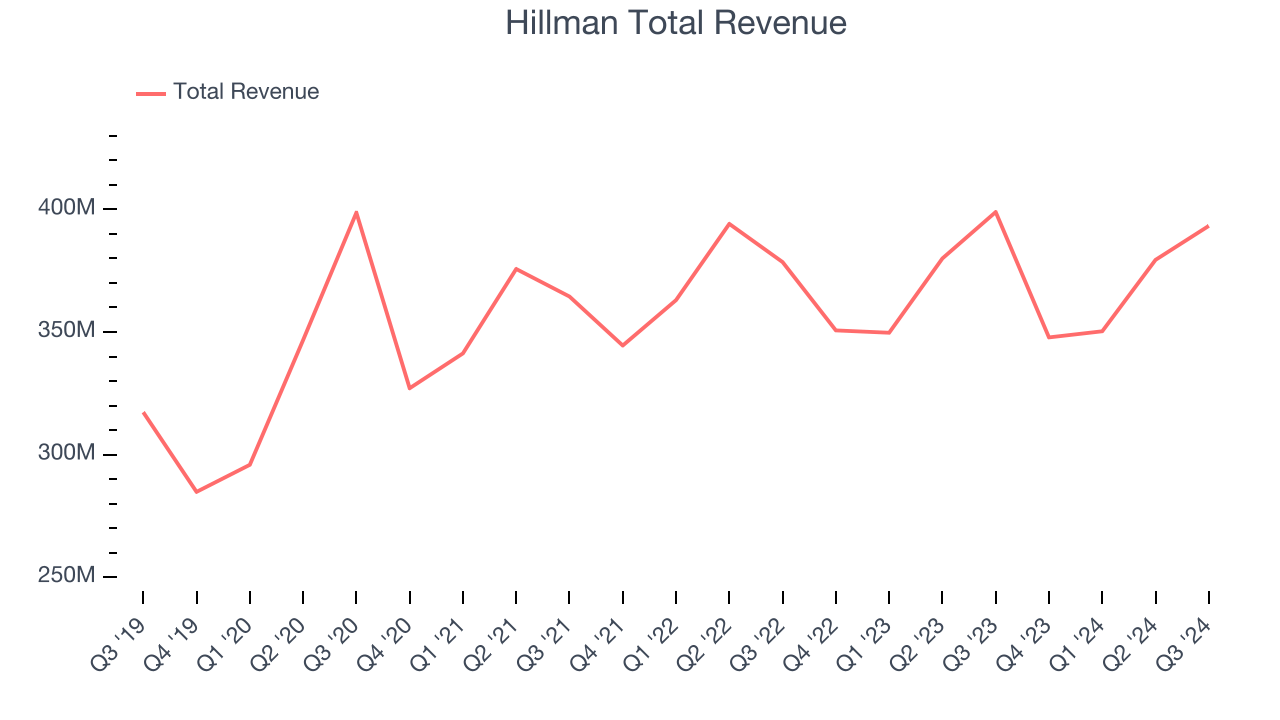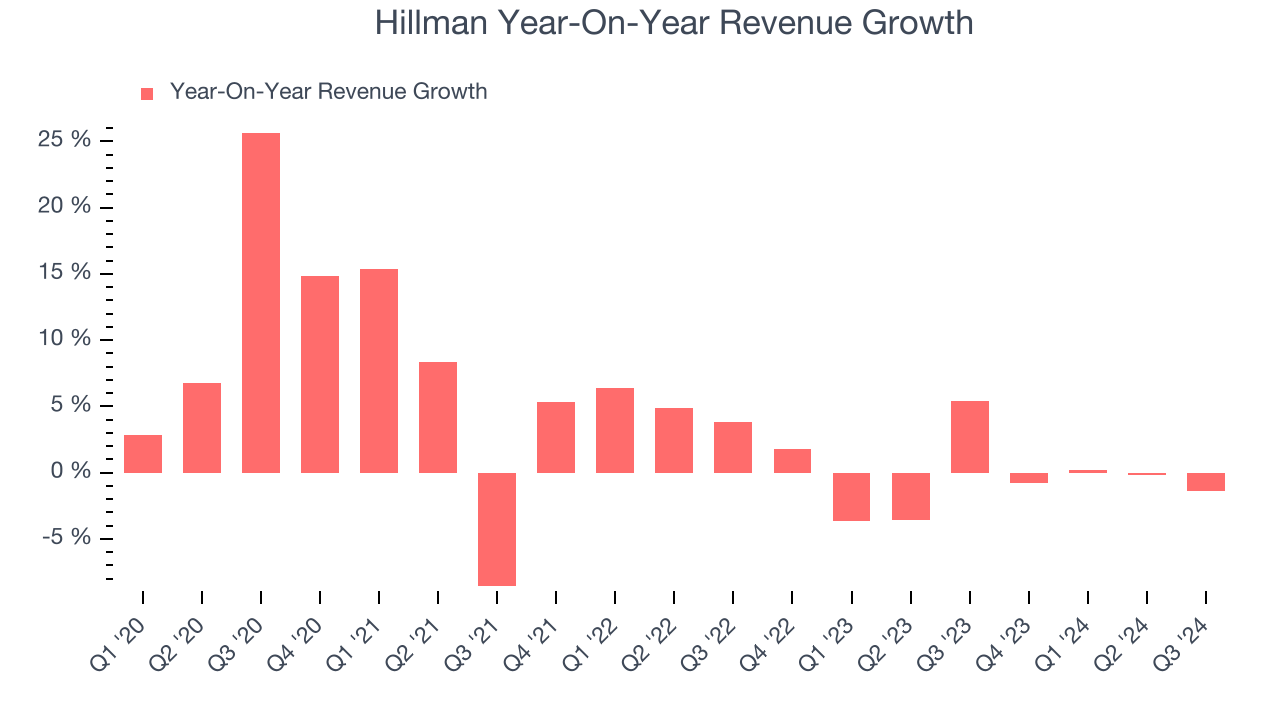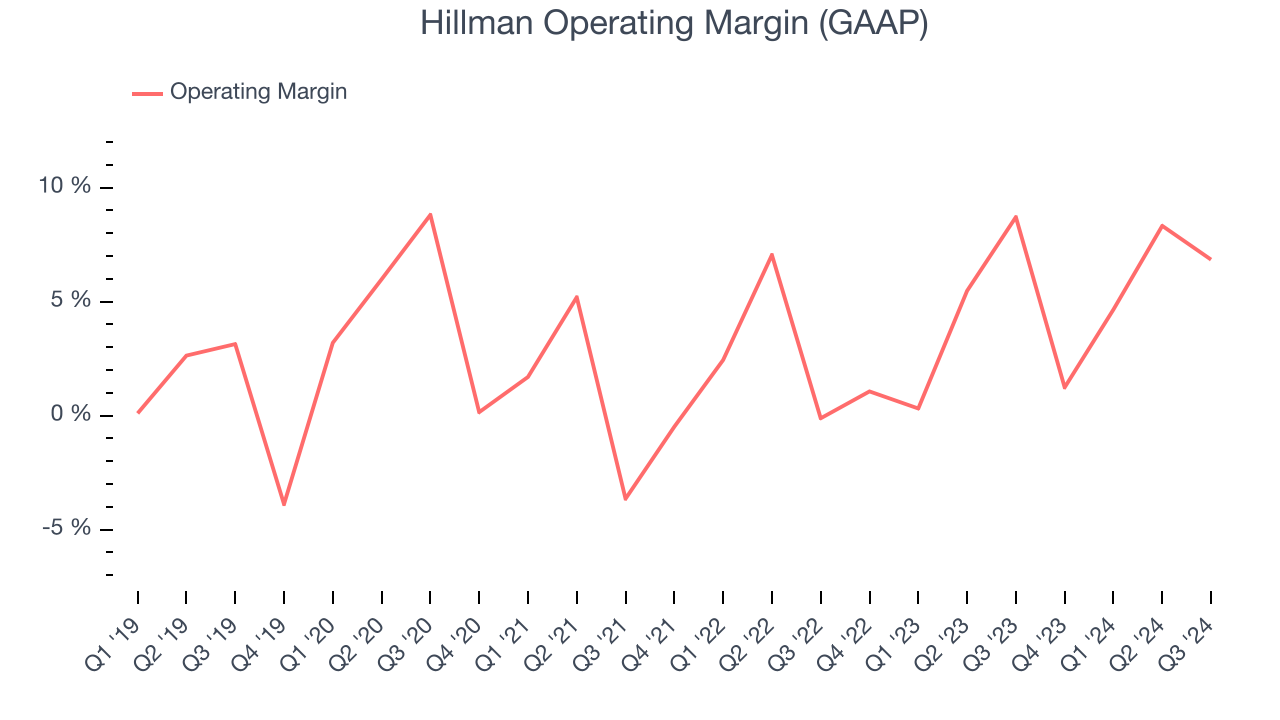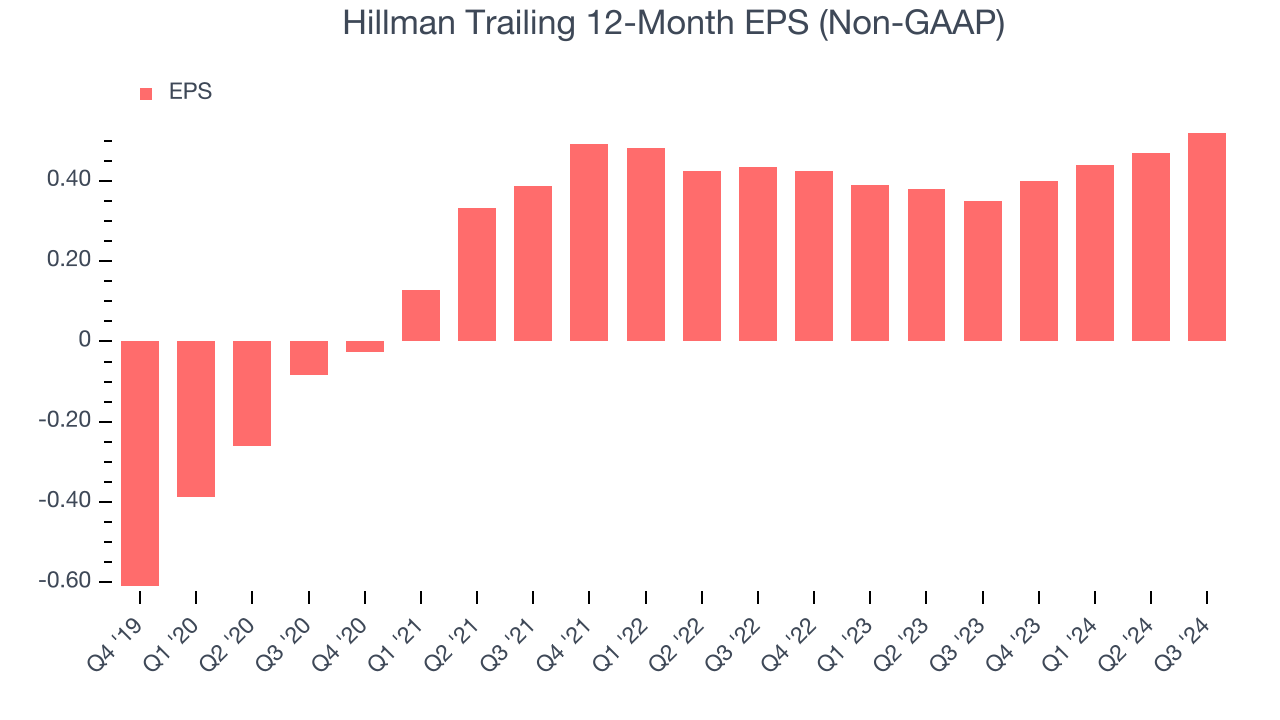
Hardware products and merchandising solutions provider Hillman (NASDAQ:HLMN) met Wall Street’s revenue expectations in Q3 CY2024, but sales fell 1.4% year on year to $393.3 million. The company expects the full year’s revenue to be around $1.47 billion, close to analysts’ estimates. Its non-GAAP profit of $0.16 per share was also in line with analysts’ consensus estimates.
Is now the time to buy Hillman? Find out by accessing our full research report, it’s free.
Hillman (HLMN) Q3 CY2024 Highlights:
- Revenue: $393.3 million vs analyst estimates of $389.5 million (in line)
- Adjusted EPS: $0.16 vs analyst expectations of $0.16 (in line)
- EBITDA: $72.56 million vs analyst estimates of $70.55 million (2.8% beat)
- The company slightly lifted its revenue guidance for the full year to $1.47 billion at the midpoint from $1.46 billion
- EBITDA guidance for the full year is $250 million at the midpoint, above analyst estimates of $246.1 million
- Gross Margin (GAAP): 48.2%, up from 44.2% in the same quarter last year
- Operating Margin: 6.8%, down from 8.7% in the same quarter last year
- EBITDA Margin: 18.4%, up from 16.7% in the same quarter last year
- Free Cash Flow Margin: 10.1%, similar to the same quarter last year
- Market Capitalization: $2.11 billion
"Our strong results for the third quarter were driven by efficient operations across the organization while taking great care of our customers," commented Doug Cahill, Chairman, President and CEO of Hillman.
Company Overview
Established when Max Hillman purchased a franchise operation, Hillman (NASDAQ:HLMN) designs, manufactures, and sells industrial equipment and systems for various sectors.
Professional Tools and Equipment
Automation that increases efficiency and connected equipment that collects analyzable data have been trending, creating new demand. Some professional tools and equipment companies also provide software to accompany measurement or automated machinery, adding a stream of recurring revenues to their businesses. On the other hand, professional tools and equipment companies are at the whim of economic cycles. Consumer spending and interest rates, for example, can greatly impact the industrial production that drives demand for these companies’ offerings.
Sales Growth
A company’s long-term performance is an indicator of its overall business quality. While any business can experience short-term success, top-performing ones enjoy sustained growth for multiple years. Over the last five years, Hillman grew its sales at a sluggish 3.9% compounded annual growth rate. This shows it failed to expand in any major way, a rough starting point for our analysis.

We at StockStory place the most emphasis on long-term growth, but within industrials, a half-decade historical view may miss cycles, industry trends, or a company capitalizing on catalysts such as a new contract win or a successful product line. Hillman’s recent history shows its demand slowed as its revenue was flat over the last two years. 
This quarter, Hillman reported a rather uninspiring 1.4% year-on-year revenue decline to $393.3 million of revenue, in line with Wall Street’s estimates.
Looking ahead, sell-side analysts expect revenue to grow 3.4% over the next 12 months, an improvement versus the last two years. While this projection indicates the market believes its newer products and services will fuel better performance, it is still below average for the sector.
Today’s young investors won’t have read the timeless lessons in Gorilla Game: Picking Winners In High Technology because it was written more than 20 years ago when Microsoft and Apple were first establishing their supremacy. But if we apply the same principles, then enterprise software stocks leveraging their own generative AI capabilities may well be the Gorillas of the future. So, in that spirit, we are excited to present our Special Free Report on a profitable, fast-growing enterprise software stock that is already riding the automation wave and looking to catch the generative AI next.
Operating Margin
Hillman was profitable over the last five years but held back by its large cost base. Its average operating margin of 3.4% was weak for an industrials business. This result is surprising given its high gross margin as a starting point.
On the plus side, Hillman’s annual operating margin rose by 1.3 percentage points over the last five years.

This quarter, Hillman generated an operating profit margin of 6.8%, down 1.9 percentage points year on year. Conversely, its gross margin actually rose, so we can assume its recent inefficiencies were driven by increased operating expenses like marketing, R&D, and administrative overhead.
Earnings Per Share
We track the long-term change in earnings per share (EPS) for the same reason as long-term revenue growth. Compared to revenue, however, EPS highlights whether a company’s growth was profitable.
Hillman’s full-year EPS flipped from negative to positive over the last five years. This is encouraging and shows it’s at a critical moment in its life.

Like with revenue, we analyze EPS over a shorter period to see if we are missing a change in the business.
Hillman’s EPS grew at a decent 9.4% compounded annual growth rate over the last two years, higher than its flat revenue. This tells us management responded to softer demand by adapting its cost structure.
We can take a deeper look into Hillman’s earnings to better understand the drivers of its performance. While we mentioned earlier that Hillman’s operating margin declined this quarter, a two-year view shows its margin has expanded by 7 percentage points. This was the most relevant factor (aside from the revenue impact) behind its higher earnings; taxes and interest expenses can also affect EPS but don’t tell us as much about a company’s fundamentals.
In Q3, Hillman reported EPS at $0.16, up from $0.11 in the same quarter last year. This print was close to analysts’ estimates. Over the next 12 months, Wall Street expects Hillman’s full-year EPS of $0.52 to grow by 4.9%.
Key Takeaways from Hillman’s Q3 Results
It was great to see Hillman’s strong full-year EBITDA forecast, which exceeded analysts’ expectations. We were also glad its EBITDA outperformed Wall Street’s estimates. Overall, this quarter had some key positives. The stock traded up 4.3% to $11.20 immediately following the results.
Sure, Hillman had a solid quarter, but if we look at the bigger picture, is this stock a buy? If you’re making that decision, you should consider the bigger picture of valuation, business qualities, as well as the latest earnings. We cover that in our actionable full research report which you can read here, it’s free.